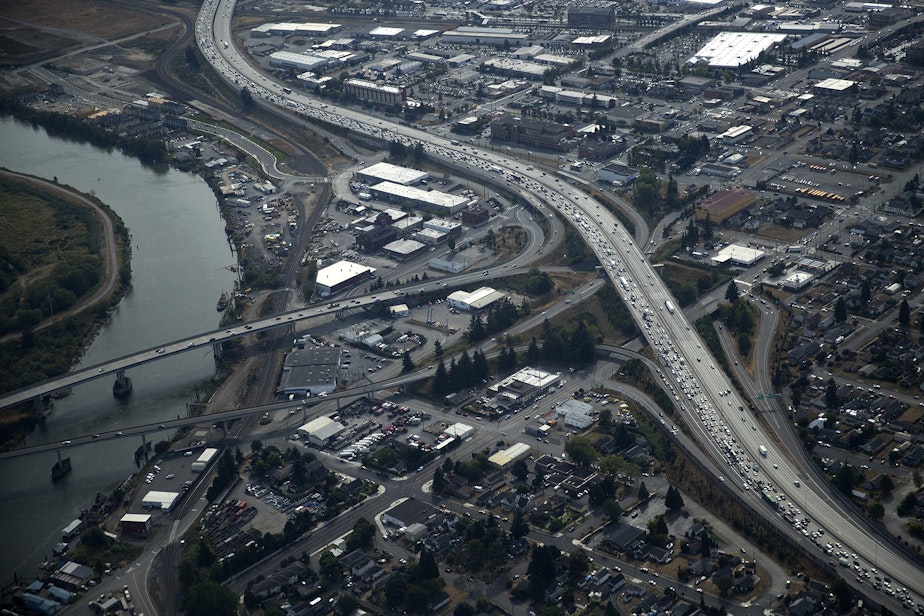Carbon problem gets worse in WA — despite 'climate hawk' governor

Gov. Jay Inslee has made fighting climate change a priority throughout his career and is positioning himself as a climate-driven candidate for president.
Yet his state’s carbon pollution has been growing year after year since he became governor in 2012.
As he often does, Inslee focused on climate change in his state of the state speech at the legislature on Tuesday.
“Science affirms the necessity of action — this day,” Inslee said. “This is the 11th hour, but it is Washington state’s hour to shine.”
Without announcing the results, the Inslee administration this week quietly published the state’s actual track record in matching Inslee’s lofty rhetoric. Not so good: Heat-trapping carbon emissions are up 6 percent since 2012. That’s despite state law requiring reductions by next year.
“We're not on track to meet the 2020 target,” said Andrew Wineke, spokesperson for the Washington Department of Ecology.
A 2007 executive order from then-Gov. Chris Gregoire requires Washington to reduce statewide emissions of greenhouse gases to 1990 levels by 2020, 25 percent below 1990 levels by 2035, and 50 percent below 1990 levels by 2050.
In October, a U.N. scientific panel said it would take much steeper reductions—and “rapid, far-reaching and unprecedented changes in all aspects of society”—to keep the planet from heating a disastrous 2 degrees Celsius or more.
Emissions in Washington were 10 percent above 1990 levels in 2015 and growing steadily, according to the new inventory.
Washington’s latest numbers show transportation, mostly cars and trucks, as the state’s biggest source of emissions. Pollution from power plants increased the most: up 25 percent from 2012 to 2015.
“Those aren't just numbers. It's the start of an environmental health emergency, especially for peoples on the front lines,” said Deric Gruen with the nonprofit Front and Centered. It aims to promote “climate justice” for communities of color, who it says will be most affected by a changing climate.
“It's those personal vehicles that are the biggest single contributor to our greenhouse gas emissions,” Wineke said.
While emissions from gasoline-fueled cars and trucks remained largely unchanged from 2012 to 2015, emissions from diesel-fueled vehicles, such as large trucks and delivery vehicles, grew 9 percent in 2014 alone.
“People are buying more stuff, you need more trucks to move it around,” Wineke said.
Washington state's top climate polluters in 2017
While cars and trucks collectively did more climate damage than any other sector, a few individual polluters had outsized impacts.
The state’s biggest single source of carbon pollution is the TransAlta coal-fired power plant in Centralia, which alone pumped out about 6 percent of all carbon dioxide emitted in the state in 2017. The state legislature has required the plant to close by 2025.
The rest of the top 10 carbon emitters show little sign of reducing their emissions in the near term.
Gov. Inslee’s climate ambitions have been stymied by the legislature and by state voters. Most recently, voters turned down a ballot measure, backed by Inslee and a broad swath of environmental and social-justice groups, that would have taxed carbon pollution.
“We're all struggling across this country to do more on climate change,” Gruen said. “We're trying to push through and break through, and I feel like that moment is coming.”
House Republicans introduced their own, less-ambitious clean-energy proposal on Wednesday, with tax breaks for businesses that adopt carbon-reducing practices, rather than regulating the use of fossil fuels, as Inslee would.
“Instead of a stick, my bill offers a menu of carrots,” Rep. Richard DeBolt of Chehalis said in a press release.
This year, the Washington legislature has wide Democratic majorities, which could give efforts to restrict fossil fuels and boost alternatives a rosier forecast.
“When your grandchildren ask what you did to protect them from climate change,” Inslee told the gathered legislators, “you can tell them you weren’t sitting around saying it was someone else’s problem. You took action.”
This story has been updated to include Republicans' climate proposal.




